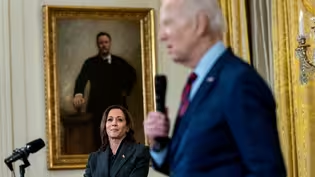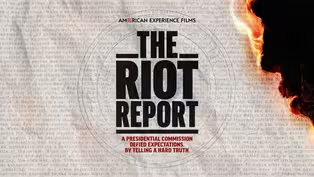
Piano prodigy BLKBOK bridges classical, contemporary music
Clip: Season 9 Episode 4 | 4m 43sVideo has Closed Captions
An interview with neoclassical pianist and composer Charles Wilson III, known as BLKBOK.
Identified as a piano prodigy by the age of eight, Charles Wilson III, known professionally as BLKBOK, has carved a unique path in the music world. His stage name, BLKBOK, pays homage to composer Johann Sebastian Bach and reflects his deep roots in pop and hip-hop. BLKBOK shares how he blends classical and contemporary music, the significance of his name and Detroit's impact on his career.
Problems playing video? | Closed Captioning Feedback
Problems playing video? | Closed Captioning Feedback
One Detroit is a local public television program presented by Detroit PBS

Piano prodigy BLKBOK bridges classical, contemporary music
Clip: Season 9 Episode 4 | 4m 43sVideo has Closed Captions
Identified as a piano prodigy by the age of eight, Charles Wilson III, known professionally as BLKBOK, has carved a unique path in the music world. His stage name, BLKBOK, pays homage to composer Johann Sebastian Bach and reflects his deep roots in pop and hip-hop. BLKBOK shares how he blends classical and contemporary music, the significance of his name and Detroit's impact on his career.
Problems playing video? | Closed Captioning Feedback
How to Watch One Detroit
One Detroit is available to stream on pbs.org and the free PBS App, available on iPhone, Apple TV, Android TV, Android smartphones, Amazon Fire TV, Amazon Fire Tablet, Roku, Samsung Smart TV, and Vizio.
Providing Support for PBS.org
Learn Moreabout PBS online sponsorship- You were a child prodigy at eight years old.
Tell me about that when you really felt this need to pursue the music career.
And I understand your parents were a major influence.
- Yeah, my parents were such an influence on me.
I started at around age four, and just had a knack for the instrument.
I come from a family of musicians and entertainers, so I guess a lot of that played into it.
But I just kept practicing.
I had a great instructor that lived in Lathrup Village and I would go every Saturday and take lessons with him, Mr. Toma Schwartz.
And it just became something that I just fell in love with, I'd say around maybe age 12 or so.
And then it just became, this is what I wanna do for a living.
So I've been doing it ever since.
- So what were the kind of unique ways that I heard about that your parents used to encourage you when you were practicing and kind of feeling your way through?
- A lot of love, but also some intimidation.
One of the rules.
- That's not the part I read about.
(both laughing) - A little bit of intimidation.
You know, one of the rules was, "If you don't practice, you don't eat in my house."
So I ate a lot when I was a kid, so that means I practiced a lot.
- So tell me about your first piano.
What was it and how did you get it?
- Oh wow.
The first piano, I don't know how my parents found it, but I think they paid about a 100 bucks for it.
And it was a Grinnell Brothers, which is a company from Detroit.
- Absolutely.
- And it was huge, it was a tank, it was massive.
But my dad kind of stripped it apart, some of the pieces apart and painted it black and put it in the music room in our house, and that's how my sister and I learned off of that huge Grinnell Brothers piano.
- Then you moved on and obviously growing up influenced by hip hop.
So tell me about that balance, that combination between the hip hop and the classical.
- Well, it was really, it was really quite interesting because my friends would be, my friends, I would hang out with them all the time, so we would be listening to all kind of different music.
But then there were certain points, like I said, I would have to practice, so I would have to leave and depart from that energy and go and play Bach or Beethoven.
And for me, my listening was very, it was a little bit of everything, all genres.
One of the things my mother used to always say, she said she would never worry about me listening to hip hop because I would listen to Ice Cube and then I would listen to Tina Turner and then I would listen to Tchaikovsky.
So she never worried about what I was digesting because I was digesting all of it.
- The whole genre.
And like you said, your name is pronounced Bach, even though you spell it B-O-K. - That's right.
- But tell me how that is an homage.
- Well, it's a little bit of an homage to Yohan Sebastian, who for me was one of the first major, he shaped how we do classical music and he was very much a renegade.
But my name comes from B-L-K being black, which is all colors combined, which is inclusive.
And then BLK is from my father's wisdom, which is, everything will be okay, but you gotta be okay with everything.
- So who were your Detroit influences?
- Oh, well, I came up in the Detroit jazz scene.
So a lot of my instructors and teachers were the masters of the time, which, Teddy Harris and Marcus Belgrave and Charles Bowles and all the guys that were the amazing jazz masters in Detroit were my instructors and very much like other fathers or other uncles to me.
So I definitely came up in a great community.
There's no better place to play music than Detroit.
(tranquil ambient music)
One Detroit Weekend: July 26, 2024
Video has Closed Captions
Clip: S9 Ep4 | 1m 44s | Dave Wagner of 90.9 WRCJ shares some events coming up this weekend in and around Detroit. (1m 44s)
OPINION | Contributors discuss President Biden’s decision to drop out of presidential race
Video has Closed Captions
Clip: S9 Ep4 | 6m 52s | Contributors discuss President Joe Biden’s decision to drop out of the 2024 election. (6m 52s)
‘The Riot Report’ details civil uprisings in 1967 Detroit
Video has Closed Captions
Clip: S9 Ep4 | 8m 15s | “The Riot Report” documentary, President Joe Biden drops out, BLKBOK and weekend events. (8m 15s)
Providing Support for PBS.org
Learn Moreabout PBS online sponsorship
- News and Public Affairs

Top journalists deliver compelling original analysis of the hour's headlines.

- News and Public Affairs

FRONTLINE is investigative journalism that questions, explains and changes our world.












Support for PBS provided by:
One Detroit is a local public television program presented by Detroit PBS


